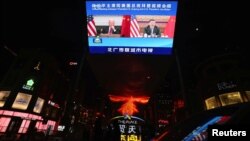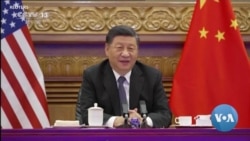Officials in Washington and Beijing said Tuesday that the inaugural meeting between President Joe Biden and President Xi Jinping was “candid” and could pave the path for progress in their tense relationship on a range of issues of global importance.
The two leaders, who have previously met in person when they were vice presidents, held their first, virtual, leader-level meeting late Monday, going beyond their planned schedule to spend more than three and a half hours discussing issues including human rights, economic competition and the status of Taiwan.
“President Biden underscored that the United States will continue to stand up for its interests and values and, together with our allies and partners, ensure the rules of the road for the 21st century advance an international system that is free, open, and fair,” the White House said in a statement issued just after midnight Tuesday, following the end of meeting. “He emphasized the priority he places on far-reaching investments at home while we align with allies and partners abroad to take on the challenges of our time.”
On Tuesday, the official state-run Xinhua News agency called the meeting “candid, constructive, substantive and productive.” It said the two sides have agreed to maintain close communication “in different forms” and “steer China-U.S. relations back on the right track.” And the state-backed Global Times said the meeting underscored “the eagerness of Biden to seek expanding ties with Beijing.”
Perhaps critically, Biden seemed to temper statements he’d previously made in support of Taiwan.
In a statement released after the meeting, the White House said the United States supports the One China policy, and “strongly opposes unilateral efforts to change the status quo or undermine peace and stability across the Taiwan Strait.” Those assurances are likely to placate Beijing, with China’s foreign minister saying in the run-up to talks that the United States needed to “stop sending wrong signals to the ‘Taiwan independence’ forces.”
But as night fell in Beijing and morning dawned in Washington on Tuesday, it remained unclear what, if anything, was achieved.
“You know, we were not expecting a breakthrough,” the Biden administration official told reporters. “There were none, none to report.”
When asked if the talks managed to reduce tensions between the two superpowers, the administration official said that wasn’t the goal of talks and that the relationship between the two should not be viewed as one that has ups and downs.
“I don’t think the purpose was to particularly ease tensions,” the official said.
Can it last? Analysts were divided on Tuesday. Zhao Tong, a senior analyst at the Beijing-based Carnegie–Tsinghua Center for Global Policy, told VOA that because of “the fundamental differences in ideology,” it will be difficult for the two sides to maintain a stable relationship, let alone cooperation.
“Both Biden and Xi talked past each other and repeated their former stances ... and both believed that the basis of improvement in bilateral relations lies in the change of the other side’s policy, and such changes cannot be expected,” he said.
But the mere fact that the two leaders heard each other out counts for something, other analysts said.
WATCH: US-China relationship to continue
“I don’t think the strained bilateral relations can be improved in the short term, but the top leaders are trying to establish working relations to some extent,” said Oh Ei Sun, a senior fellow, Singapore Institute of International Affairs.
Huang Kwei-Bo, an associate professor of diplomacy, at Taiwan’s National Chengchi University, was more optimistic.
“They all have met each other and got to know each other’s bottom line,” Huang said. “Of course there are still differences between the two sides, but you can see the atmosphere and tones are very different this time, it’s not as tense as it used to be.”
And, said Matthew Goodman, Senior Vice President for economics at the Center for Strategic and International Studies, a lack of tangible outcomes is not the worst outcome.
“It’s an important moment, I think, even if not much comes out of it,” he said. “It’s important for the two leaders to talk.”
‘Just simple, straightforward competition’
Biden launched the marathon meeting with a friendly greeting before shifting quickly into a sober reflection on the challenges that divide the two nations.
“It seems to me that our responsibility as leaders of China and the United States is to ensure that the competition between our countries does not veer into conflict,” Biden said late Monday from the White House, as the two leaders spoke in a video call between Washington and Beijing. “Whether intended or unintended — just simple, straightforward competition.”
Xi also acknowledged the many issues between the two great powers and, as expected, defended his nation’s sovereignty against what Beijing has long perceived as American and international judgment and pressure.
“We should each run our domestic affairs well and, at the same time, shoulder our share of international responsibilities and work together to advance the noble cause of world peace and development,” Xi said. “This is a shared desire of the people of our two countries and around the world.”
Biden emphasized that the countries need to establish “guardrails” to avoid conflict and work together where possible on issues such as climate change. That was among the other issues the leaders discussed, the White House said, which also included discussions on regional challenges including North Korea, Afghanistan, and Iran.
On upcoming denuclearization talks with Iran, the senior administration official told VOA that the two sides exchanged views on their expectations ahead of negotiations, and will seek ways to ensure that the talks, which are set to resume at the end of the month, are productive.
The United States sees China as its strategic competitor, with Beijing making gains on its military and economic dominance around the world. The two are embroiled in diplomatic, legal, technological and economic disputes that are volatile and prone to escalation. There have been clashes over intellectual property and tariffs as well as regional flashpoints that could spiral into armed conflict, including in the Taiwan Strait and in the South China and East China seas.
The White House said that Biden raised concerns about human rights in Xinjiang, Tibet, Hong Kong, and more broadly. He also pushed Xi over what the U.S. sees as unfair trade and economic practices by China.
VOA's Lin Yang and Joyce Huang contributed to this report.
Editor's note: An earlier version of this story contained incorrect information on the U.S. policy toward Taiwan independence.






